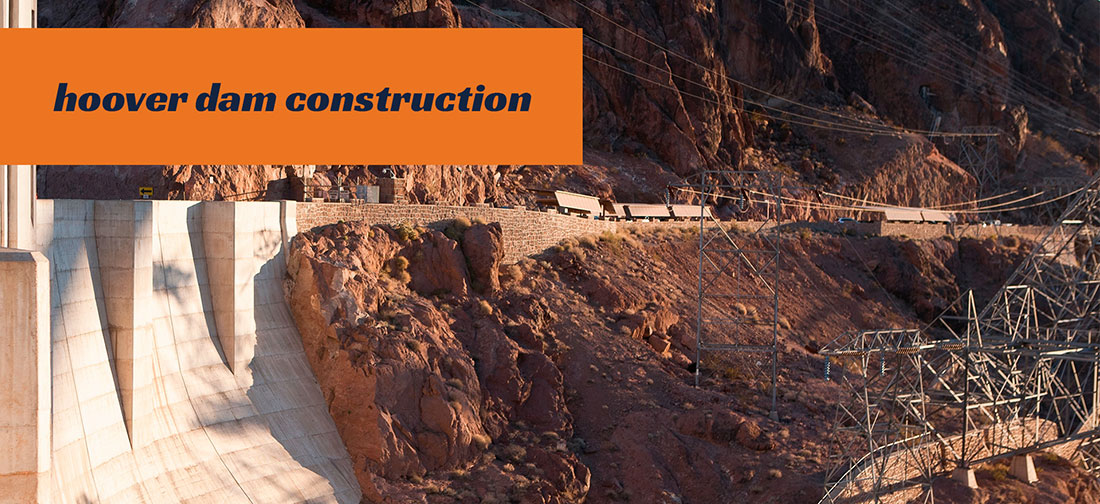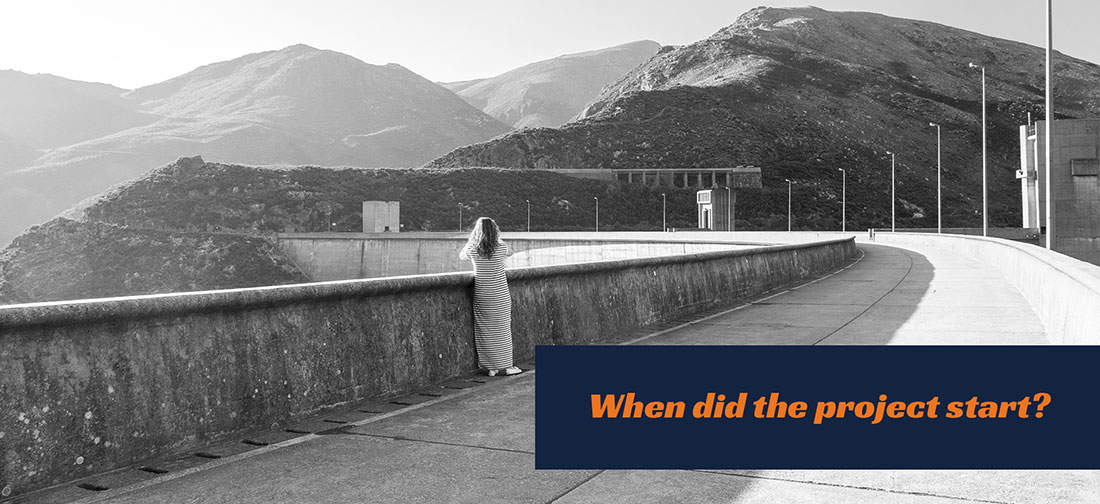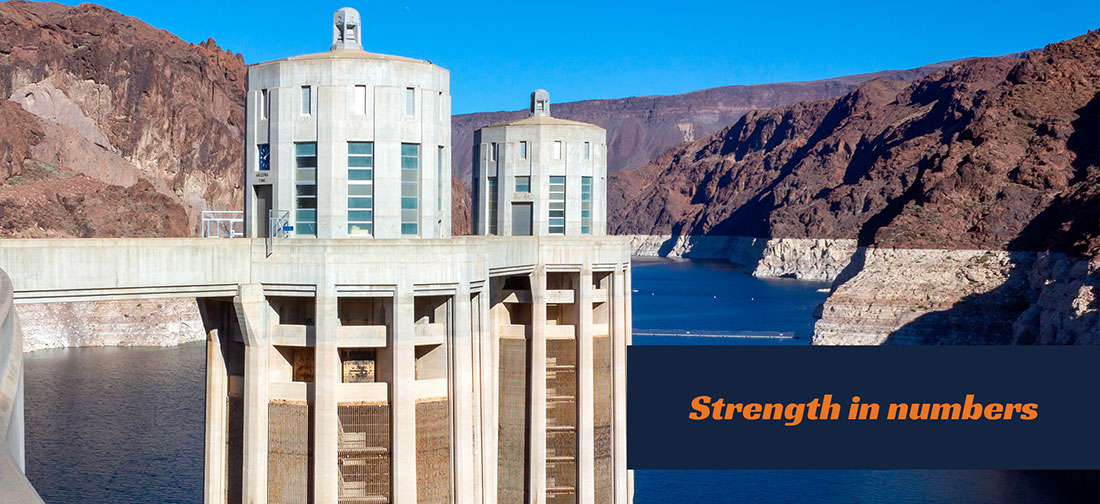How Has Hoover Dam Impacted Growth of the American West?
Towering 700 feet above the desert, the Hoover Dam is one of the most iconic and memorable structures in the American West. The Hoover Dam has been an essential source of water, power, tourism, and recreation for decades. The dam is such a solid fixture in US history that historians equate it to the Roman aqueducts and Egyptian pyramids. Today, it remains a popular destination for visitors from around the world.
Why was the Hoover Dam built?
Inspiration for the Hoover Dam came from a major flood that hit San Diego, CA, in 1905. That flood hit the Imperial Valley hard enough to turn the adjacent Salton Sink into the Salton Sea. In the process, the massive flood put over $2B worth of produce at risk. The Imperial Valley received its water supply from the Colorado River, but a poorly constructed canal that normally regulated the river’s water flow failed, causing the Colorado River to flood the adjacent lands. After that disaster, Theodore Roosevelt, the president at the time, launched a campaign to build the dam to prevent future catastrophic flooding.

The government steps in.
In the early 1900s, the US Bureau of Reclamation started to lay out plans for the Hoover Dam. The bureau’s goal was to build a massive dam that was large enough to prevent water from the Colorado River from flooding the surrounding areas. Additionally, the bureau wanted the dam to supply the nearby population with hydroelectric power.
When did the project start?
In 1922, the Hoover Dam’s construction got the green light when former President Hoover asked the seven states that contain the Colorado River basin, including Arizona, California, and Nevada, to reach an agreement on allocating the waters of the Colorado River once the Hoover Dam was constructed.
Once the states reached an agreement, the Director of the US Bureau of Reclamation, Arthur Powell Davis, created a plan that he presented to Congress for the dam’s construction in the Black Canyon, which lies along the Arizona-Nevada border and is the ultimate destination for those on a Black Canyon Hoover Dam kayak tour.

Construction on the Hoover Dam begins.
The Hoover Dam’s construction was long, tedious, and dangerous. Construction crews braved narrow tunnels and worked at heights 800 feet above ground to clear canyons and other earthen debris in order to build the Hoover Dam. The dam’s construction happened largely during the Great Depression, which meant that construction was always ongoing as many workers were willing to travel to the US for employment. The construction workers set up semi-permanent camps in the desert to complete the project. Eventually, they were given housing in the town of Boulder City, which is also a popular tourist attraction and a historic relic today. Boulder City was built specifically to house the laborers who came to work on the Hoover Dam. Boulder City is located six miles from the construction site. The construction firm that was ultimately hired to work on the Hoover Dam was called Six Companies, and the contract for the firm was awarded in 1931.
After years of hard work, the dam’s construction was completed in 1935. The Hoover Dam was the largest dam in the world when it was finished, and it is still one of the largest and most impressive man-made objects today. Lake Mead, which is the reservoir surrounding the dam, can contain enough water at full capacity to supply over two million acres of land with water. Along with supplying water to important agricultural fields, the Hoover Dam and Lake Mead are popular tourist attractions.
An architect’s magic touch
The Hoover Dam was constructed primarily by engineers, but an architect was hired to give it its finishing aesthetic touches. The architect who was hired to complete the Hoover Dam was Gordon Kaufmann. Kaufmann designed the dam with an emphasis on showcasing its sheer size. In order to do that, the dam’s face was kept simple and free of adornments. Aluminum fins were added to the dam’s exterior to resemble windows, and its interior paid homage to the Southwest with Native American-inspired decorations.
Strength in numbers
The Hoover Dam is impressive by the numbers from top to bottom. The dam stands 726 feet above the canyon it is built on. If you’re walking through the dam on foot or going on a kayak Hoover Dam tour, you can truly get a sense of the dam’s sheer size. The Hoover Dam is constructed with five million barrels of cement and about 45 million pounds of steel. Collectively, the dam was constructed with the help of over 21,000 workers. Nearly seven million tons of concrete were used to build the Hoover Dam, which is enough concrete to build a road from New York City to San Francisco.

Support for the local community
Along with simply being an impressive structure, the Hoover Dam has some practical uses as well. The Hoover Dam can hold enough water to irrigate two million acres of land. It has 17 working turbines, which produce enough power to send electricity to over one million homes. The Hoover Dam was designated as a National Historic Landmark in the mid-1980s. In 1994, it was designated as one of the country’s Seven Modern Civil Engineering Wonders.
The Mike O’Callaghan-Pat Tillman Memorial Bridge
Along with the Hoover Dam, there are several other notable attractions to check out when you visit it. One is the Mike O’Callaghan-Pat Tillman Memorial Bridge. This bridge is the first one in the country to have a steel arch and concrete composition. The bridge is also known as the “Memorial Bridge” and the “Freedom Bridge.” This bridge is designed to alleviate traffic around the Hoover Dam, but it’s also a great place to walk and take photos. The Memorial Bridge opened in 2010, and it has the notable title of being the widest twin-ribbed arched bridge in the Western Hemisphere and the highest arched bridge made of concrete in the world. The views from the bridge are spectacular no matter where you stand.
You can also take tours of the Hoover Dam. A self-guided tour is a great way to learn more about the dam’s history. You can also sign up for a power plant tour, which is a guided tour that takes you through some of the dam’s original construction tunnels. This tour also gives you a glimpse of the generators that run the dam.
Tourist attractions
Today, the Hoover Dam and Lake Mead are both popular places. Both places attract tourists from across the country and around the world. The Hoover Dam has an average of seven million visitors every year, and many sign up for Hoover Dam kayak rentals. Lake Mead, which is the largest reservoir in the world, gets about 10 million visitors annually. Both are great places to go on Las Vegas kayak tours, where you can learn about their human and natural history. The Black Canyon, Emerald Cave, and Colorado River, which are close to the Hoover Dam, are also popular destinations. If you are looking for Las Vegas kayak tours with knowledgeable and experienced guides, be sure to contact Blazin’ Paddles to find out what tours are available for you to get out on the water.
Get in touch with Blazin’ Paddles today to learn more about how to kayak Hoover Dam.

